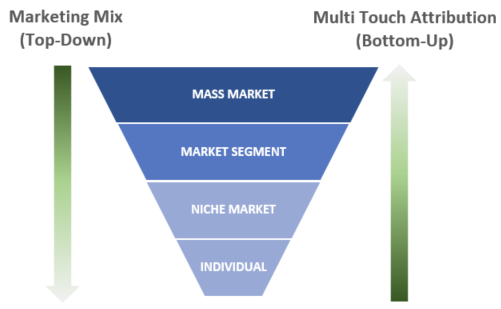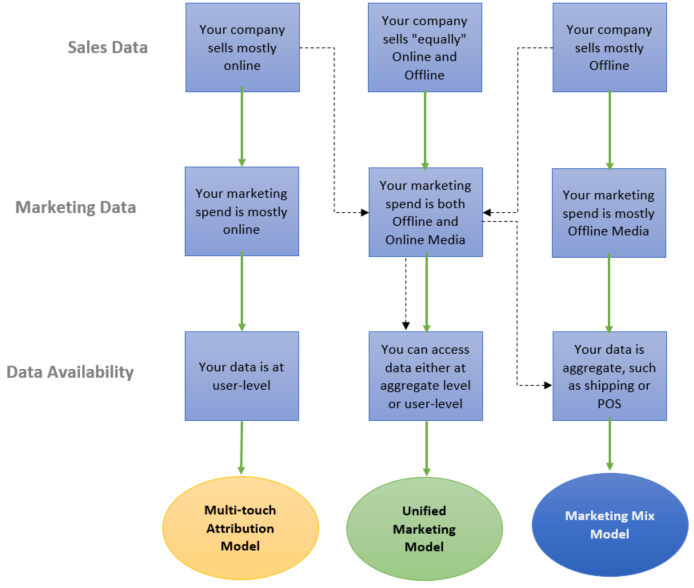Francesco Sguanci
1 Year Ago
Often, Dunn Solutions’ clients ask me whether they should do Marketing Mix Modeling, Attribution Modeling, or both, and are often unclear about the difference between Marketing Mix Modeling and Attribution Modeling.
You can find many online sources trying to define the difference between Marketing Mix Modeling and Attribution Modeling, but you will have to sift through countless documents to find a layman’s explanation of what these two methodologies are and, more importantly, which one fits your business model. After reading this blog I hope you will have a better understanding of marketing mix modeling and attribution modeling, their pros, and cons, and which one your organization should use.

Marketing Mix Modeling (MMM)
Let’s start with Marketing Mix Modeling (MMM). Marketing Mix Modeling provides a top-down view into the marketing landscape. It uses aggregated sales and marketing data and is ideal for measuring the effectiveness of high-level channels that the masses engage with the most. There are several advantages to using Marketing Mix Modeling; first, because Marketing Mix Modeling uses historical data, it provides a long-term view of how marketing channels’ effectiveness is changing over time. Second, because Marketing Mix Modeling controls for a full range of other variables, it calculates real incrementality from marketing over baseline sales. Finally, the outputs of the Marketing Mix Modeling can be used to optimize the marketing budget and devise the “perfect” mix of spend.
Marketing Mix Modeling could be run by market segment and by campaign without the hassle of collecting user-level data. However, its effectiveness and accuracy decay as we move further and further away from mass advertising towards individualized, targeted marketing. Because of these characteristics, Marketing Mix Modeling is more effective in calculating the incremental effect of ALL digital advertising rather than specific insights into each tactic.
Multi-touch Attribution (MTA)
Multi-touch Attribution (MTA), on the other hand, uses individual, or user-level trackable media data, to look at each touchpoint and to score the relative impact they had towards a conversion. By summing the relative impact of each touchpoint, Multi-touch Attribution quantifies the total media channel lift provided by addressable media. The ideal Multi-touch Attribution model uses machine learning to objectively assign appropriate credit to the media touchpoints in the consumer’s journey to conversion.

As powerful as this sounds, you must be able to track all media and connect them to an individual. This is a complex process, and often impossible for offline media such as TV, radio, or magazines. This drawback leads to under-attribution of offline activities and a failure to take baseline conversions (those that would happen without any marketing efforts) into account. Therefore, Multi-touch Attribution is best suited to drill down the digital channel and gain insights towards each tactic. Not surprisingly, Multi-touch Attribution is often seen as a subset of Marketing Mix Modeling.
Which One Should You Use?
So, which one is better? Well, it depends on many factors, such as the overall goal of the analysis, the kind of industry, the marketing mix you use, and the data availability. While it is impossible to say one is “better” than the other, this diagram can give you some guidance if you are considering a way to optimize your marketing spend:
While this blog is not meant to be a comprehensive explanation of Marketing Mix Modeling and Multi-touch Attribution, I hope it sheds some light on the differences between the two methodologies, and their pros and cons. Dunn Solutions’ machine learning consultants have performed many Marketing Mix Modeling and Multi-touch Attribution analyses, and has designed a unified approach that integrates the two methodologies to gain more meaningful insights into your marketing effectiveness. Dunn Solutions’ analytics consultants would be glad to give you a no-charge, no-commitment evaluation of your data and discuss whether there’s an opportunity to design the correct approach to maximize you return on marketing investment!
Contact us today to learn more!




